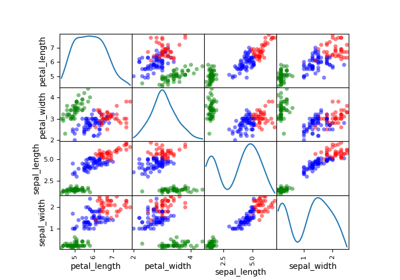kmeans module¶
The k-means algorithm for clustering.
The k-means algorithm groups the data into clusters, where the number of clusters \(k\) is fixed. This is done by initializing \(k\) centroids in the design space. The points are grouped into clusters according to their nearest centroid.
When fitting the algorithm, each centroid is successively moved to the mean of its corresponding cluster, and the cluster value of each point is then reset to the cluster value of the closest centroid. This process is repeated until convergence.
Cluster values of new points may be predicted by returning the value of the closest centroid. Denoting \((c_1, \cdots, c_k) \in \mathbb{R}^{n \times k}\) the centroids, and assuming no overlap between the centroids, we may compute the prediction
A probability measure may also be provided, using the distances from the point to each of the centroids:
where \(C_i = \{x\, | \, \operatorname{cluster}(x) = i \}\). Here, \(\mathbb{P}(x \in C_i)\) represents the probability of cluster \(i\) given the point \(x\).
This concept is implemented through the KMeans class
which inherits from the MLClusteringAlgo class.
Dependence¶
This clustering algorithm relies on the KMeans class of the scikit-learn library.
- class gemseo.mlearning.clustering.kmeans.KMeans(data, transformer=mappingproxy({}), var_names=None, n_clusters=5, random_state=0, **parameters)[source]
Bases:
MLPredictiveClusteringAlgoThe k-means clustering algorithm.
- Parameters:
data (IODataset) – The learning dataset.
transformer (TransformerType) –
The strategies to transform the variables. The values are instances of
Transformerwhile the keys are the names of either the variables or the groups of variables, e.g."inputs"or"outputs"in the case of the regression algorithms. If a group is specified, theTransformerwill be applied to all the variables of this group. IfIDENTITY, do not transform the variables.By default it is set to {}.
var_names (Iterable[str] | None) – The names of the variables. If
None, consider all variables mentioned in the learning dataset.n_clusters (int) –
The number of clusters of the K-means algorithm.
By default it is set to 5.
random_state (int | None) –
If
None, use a random generation of the initial centroids. Otherwise, the integer is used to make the initialization deterministic.By default it is set to 0.
**parameters (int | float | bool | str | None) – The parameters of the machine learning algorithm.
- Raises:
ValueError – When both the variable and the group it belongs to have a transformer.
- EPS = 2.220446049250313e-16
- LIBRARY: Final[str] = 'scikit-learn'
The name of the library of the wrapped machine learning algorithm.
- SHORT_ALGO_NAME: ClassVar[str] = 'KMeans'
The short name of the machine learning algorithm, often an acronym.
Typically used for composite names, e.g.
f"{algo.SHORT_ALGO_NAME}_{dataset.name}"orf"{algo.SHORT_ALGO_NAME}_{discipline.name}".
- algo: Any
The interfaced machine learning algorithm.
- learning_set: IODataset
The learning dataset.
- n_clusters: int
The number of clusters.
- transformer: dict[str, Transformer]
The strategies to transform the variables, if any.
The values are instances of
Transformerwhile the keys are the names of either the variables or the groups of variables, e.g. “inputs” or “outputs” in the case of the regression algorithms. If a group is specified, theTransformerwill be applied to all the variables of this group.


